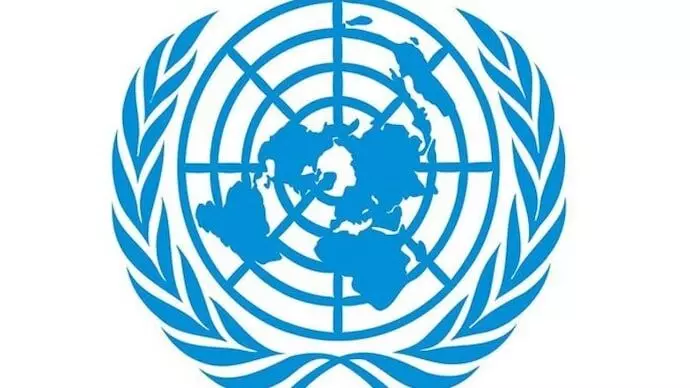
Taliban's restriction on Afghan women working for UN condemned by UNCS
text_fieldsUnited Nations: The UN Security Council has unanimously denounced the Taliban's decision to forbid Afghan women from working for the UN in Afghanistan and urged the de facto rulers to "swiftly reverse" any laws or practices that prevent women and girls from exercising their basic rights.
The 15-nation Council, under the current Presidency of Russia, unanimously passed the resolution on Thursday that “condemns the decision by the Taliban to ban Afghan women from working for the United Nations in Afghanistan, which undermines human rights and humanitarian principles.” The resolution also calls for the full, equal, meaningful and safe participation of women and girls in Afghanistan.
It also calls upon the Taliban to “swiftly reverse the policies and practices that restrict the enjoyment by women and girls of their human rights and fundamental freedoms including related to their access to education, employment, freedom of movement, and women’s full, equal and meaningful participation in public life.” It urges all States and organisations to use their influence, in conformity with the Charter of the United Nations, to promote an urgent reversal of these policies and practices.
Permanent Representative of the United Arab Emirates to the UN Ambassador Lana Nusseibeh, delivering a statement on behalf of Japan and her country in their capacity as co-penholders on the Afghanistan file, said the restrictions imposed by the Taliban are unprecedented in the history of the United Nations, and they put the very presence of the UN in Afghanistan in jeopardy.
“By adopting this resolution, the Council would send an unequivocal message of condemnation and a clear call for the swift reversal, not only of this latest ban but of others restricting the rights of women and girls in Afghanistan,” she said.
Noting that over 90 states co-sponsored the resolution, not just from the Security Council, but from Afghanistan’s immediate neighbourhood, from the Muslim world, and from all corners of the Earth, Nusseibeh said: “This cross-regional support makes our fundamental message today even more significant: the world will not sit by silently as women in Afghanistan are erased from society.” US Ambassador Robert Wood, Alternate Representative for Special Political Affairs, told the Council that Muslim-majority countries have spoken out against the Taliban’s rationale for these decisions.
In January, the Organisation of Islamic Cooperation emphasised that Islamic law calls for women’s education, work, and participation in public life.
The UN and its Member States will not remain on the sidelines when women and girls are deprived of exercising their human rights.
“The Taliban’s edicts are causing irreparable damage to Afghanistan – they erase women and girls from society. They also move the Taliban further from its desire to normalize relations with the international community.
“The United States continues to urge an inclusive political process among Afghans that leads to a representative government – a government that is accountable to its people and fully reflects Afghanistan’s rich diversity, including the meaningful participation of women and members of minority communities,” he said.
The resolution also reiterated its demand that all parties allow full, rapid, safe, and unhindered humanitarian access for the personnel of United Nations humanitarian agencies, their partners, and other humanitarian actors and providers of basic services, regardless of gender.
Russia’s Permanent Representative to the UN Ambassador Vassily Nebenzia said that Moscow notes the efforts of UAE and Japan who searched for “compromise solutions” while taking into account a wide range of positions and wanted to draft a document that should account for the whole set of challenges that Afghanistan is faced with today.
“In this regard, it causes sincere regret and disappointment that steps towards a more prominent reflection of all these problems were actually blocked by a number of Western colleagues led by the United States,” he said.
Nebenzia added that Moscow does not welcome the decision of the Taliban to restrict the rights of women and girls and that these bans must be lifted.
“However, the real reasons for the unresolved issue of unfreezing Afghan assets that belong to the Afghan people; calls for increasing humanitarian assistance and restoring the country’s economy; and the negative consequences of unilateral sanctions did not make it to the resolution.
“This approach of Western colleagues no longer surprises us though. This is just another example of the double standards of the US and its allies when discussing various conflicts in the Council,” he said.
A record 28.3 million people in Afghanistan are in need of assistance this year, making Afghanistan the world’s largest aid operation, with the UN asking for USD 4.6 billion to fully fund relief efforts this year.
The decision by the Taliban earlier this month to prohibit Afghan women from working for the UN in Afghanistan was strongly condemned by leaders of the World organisation.
The UN was notified by the de facto authorities that no Afghan woman was permitted to work for the UN in Afghanistan and that this measure will be actively enforced.
The decision extended the directive previously announced in December last year, banning Afghan women from working for national and international non-governmental organisations.
The UN had approximately 3,900 staff in Afghanistan, approximately 3,300 are nationals and 600 internationals.
Of those, there are about 400 women nationals and 200 women internationals. The UN instructed all national staff – men and women – not to report to the office until further notice.
With PTI inputs























